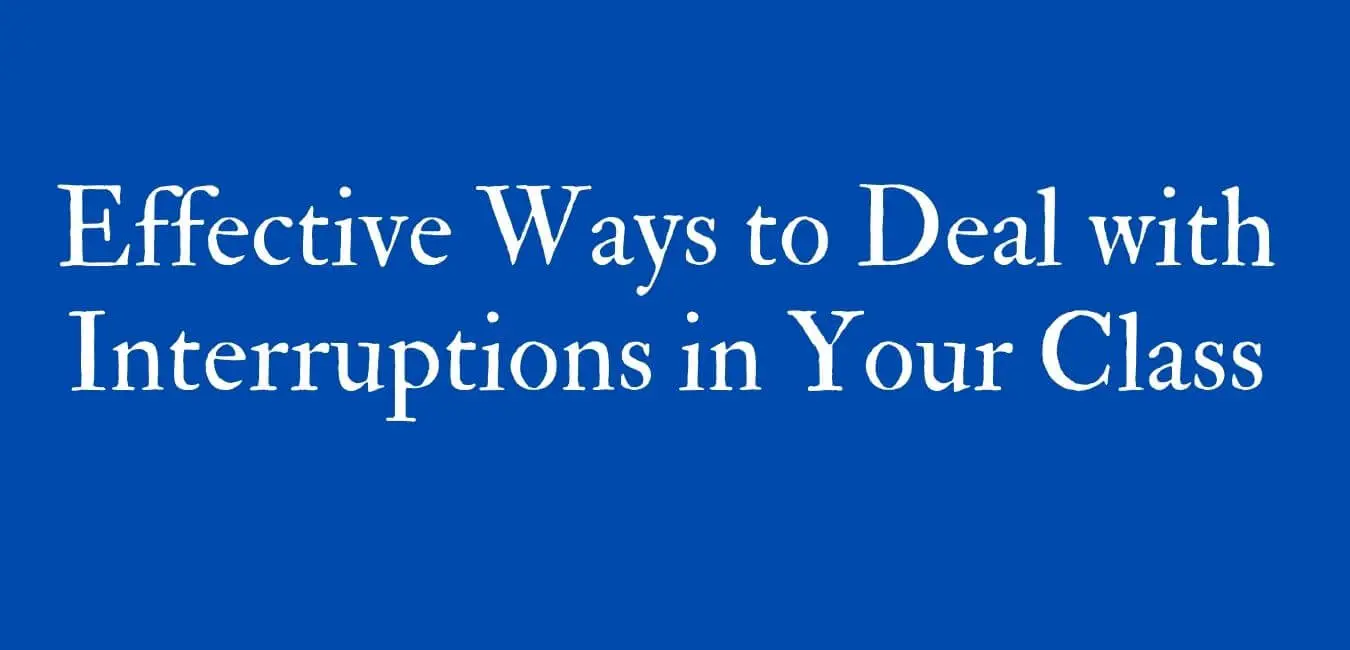Interruptions in the class have been a source of stress for many teachers, including myself. This is especially true for newbie teachers. They strive to stop students from interrupting, and because of their inexperience they don’t see many results.
Student interruptions normally occur among young learners, but the situation improves with age. However, some students still have difficulties controlling the urge of interruption in the class.
Despite the difficulties in discouraging interruption, I am confident you can succeed in doing that.
You can adopt the following tips to help you deal with it, but you have to practice, practice, practice, practice, and be patient. The following tips can help you solve problems regarding interruption:
1. Plan yourself and your students
2. Set the rules to avoid interruption
3. Set the reward for obeying the rules
4. Set the consequences for not following the rules.
5. Practice the situation
6. Repeat the process
The tips mentioned above were adapted from the research of Kapalka (2005c and 2005d). I have applied this method and have seen improvement in the levels of interruptions in my classroom.
Why Do Students Interrupt?
Impulsivity is the major cause of interruption in the classroom. Those who struggle to control themselves are more likely to engage in interruption. These students often suffer from ADHD.
Impulsive kids exhibit their behaviors in the classroom by calling out without prior permission from their teachers.
They do not only exhibit this behavior in the classroom, it is a repetitive behavior the parents might have been battling with every day. You must not be quick to judge them, thinking they do that intentionally. I know how irritating it can be. Don’t lose your cool when dealing with this Behavior.
The Key Strategies To Avoid Interruption
Now that we understand why students interrupting, we need to look at the various strategies in detail. They are:
Planning Yourself And Your Students
Think through your philosophy of classroom management and the possible instructions to help you address the problem. Discuss the problem without naming students who engage in it.
During the discussion, make sure you have a contact.
Also, stay calm and in control of yourself. Make the necessary arrangements to help you carry out this portion of classroom management.
Set Rules And Responsibilities
To address the problem, you need rules and responsibilities to be performed by each party to make sure you have a class without interruptions. The following tips can guide you in making the rules and responsibilities of your class:
1. Make sure to engage everyone in the process. This makes everyone responsible for the effectiveness of the rules.
2. Explain accepted rules to the understanding of everyone.
3. A visual aid of the final rules is posted in the class and make sure everyone can see it.
4. Rules must be clear and specific. For example, “don’t interrupt, raise your hand and wait for me to give you a chance to speak.” Never say, “don’t misbehave”.
Evolving everyone in the stage of making the rules is extremely useful because they will be responsible for the rules they have helped create. Due to this, they will not want to go against them. Whether we like it or not, rules are necessary for the successful running of classrooms.
Make Rewards For Obeying The Rules
Assigning reasonable and commensurable rewards for following the rules. But keep in mind, sometimes crush the motivation of students to embark on a particular Behavior. In making rewards, note the following:
1. There are extrinsic and intrinsic Rewards.
2. Individuals are motivated differently
3. Tell students clearly about the rewards for obeying the rules.
4. Be specific about the reward students will end for good behavior.
5. Examples of the rewards are chips, computer time, praise, student of the week award, etc.
The topic of making and using rewards in the classroom is complex, and I will be putting up an article on how to use it. Rewards can help you get your students to stop interrupting you and their colleagues during lessons.
Make Consequences For Not Obeying The Rules
Some students may not follow the rules and regulations regarding interruptions. Therefore, there is the need to implement consequences for non-compliance.
For example, withdrawing the reward the students would have gotten if he or she had stopped the behavior. This consequence is negative and is commensurate with the reward for compliance, therefore it is appropriate. If it doesn’t work, a much tougher consequence can be used. For example, a letter to the students’ parents.
Practice
None that you have the rules, its rewards, and consequences, it is left for you to practice the activity. It will take time for you to achieve full compliance.
Always issue a clear but brief reminder to students about the positive and negative consequences of complying with the rules and responsibilities in this situation. When doing this, address the whole class.
With this, defaulting students will understand you and will change with time. This avoids any embarrassment to them. Sometimes you can allow students to repeat the rules, rewards, and consequences for you. This makes them stick in the minds of the students.
Repeat The Process
As mentioned earlier, results cannot be achieved in a short time. You have to continue practicing the activity and repeating the process. It is Advisable to continue revising the process. This will help you capture any changes in students’ behavior and needs. You may have to revise this process every semester.
Conclusion
In this article, we understood what causes interruption among students. We also came out with tips to help you deal with interruptions. I believe that if you implement this activity and practice it with patience, you will get results. Thank you.







